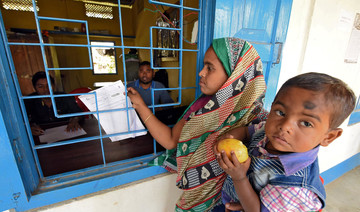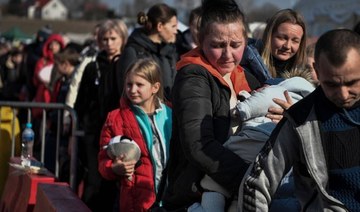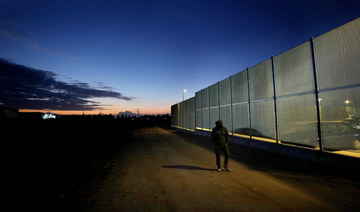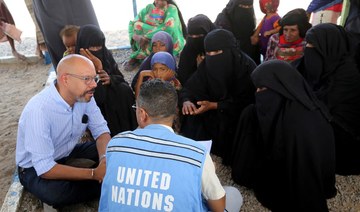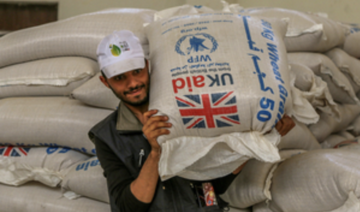MAYONG, India: The rice farmer doesn’t know how it happened. Abdul Mannan just knows a mistake was made somewhere. But what can you say when the authorities suddenly insist one of your five children isn’t an Indian? What do you do when your wife and daughter-in-law are suddenly viewed as illegal immigrants?
“We are genuine Indians. We are not foreigners,” said Mannan, 50, adding his family has lived in India’s northeastern Assam state since the 1930s. “I can’t understand where the mistake is.”
Neither can nearly 4 million other people who insist they are Indian but who now must prove their nationality as the politics of citizenship — overlaid with questions of religion, ethnicity and illegal immigration — swirls in a state where such questions have a long and bloody past.
Today, nativist anger churns through the hills and plains of Assam state, just across the border from Bangladesh, with many here believing the state is overrun with illegal migrants.
“India is for Indians. Assam is for Indians,” said Sammujjal Bhattachariya, a top official with the All Assam Students Union, which has been in the forefront of pushing for the citizenship survey. “Assam is not for illegal Bangladeshis.”
“We need a permanent solution,” he added.
On Friday, some of the 3.9 million residents left off Assam’s draft list of citizens began picking up forms to file their appeals, wading into a byzantine legal and bureaucratic process that many fear could lead to detention, expulsion or years in limbo.
Mannan, his two daughters and two of his sons were all listed on the citizenship list released in July. But his wife, a 17-year-old son and his daughter-in-law were nowhere to be seen. No explanation was given.
“We are worried that the names are not there,” said Mannan, who lives with his family in a bamboo-walled hut, supporting them on about $150 a month in farming income. “How will we live? What will we do? How will we stay in Assam?“
For decades, fears of widespread movement across the porous border with Bangladesh have triggered tensions between the state’s majority ethnic group, Assamese-speaking Hindus, and its Bengali-speaking Muslims.
In the 1980s that erupted into violence, with hundreds of people killed in Assam amid waves of anti-migrant attacks. New Delhi eventually ruled that anyone who could prove their family had lived in India before Bangladesh’s 1971 war of independence, which drove millions of Bangladeshis to flee across the border, would be considered an Indian citizen.
But proving that can be deeply complicated in a region where basic paperwork — birth certificates, marriage certificates, leases — has only recently become commonplace in many rural villages.
State officials insist they have done everything possible to make the procedure fair.
“It’s been an extremely exhaustive process,” said Prateek Hajjela, the coordinator of the citizenship project that involves 52,000 officials, visits to 6.8 million families and countless hearings to examine the details of family trees.
But the politics of religion and ethnicity have been on the rise in India since 2014, when the Hindu nationalist Bharatiya Janata Party was swept to power in national elections. The party quickly pushed to update the citizenship registry in Assam, where politicians have eagerly grabbed hold of the issue.
“First our target is to segregate the foreigners. What steps we will take against them will come next,” Assam’s top elected official, Sarbananda Sonowal, told the Times of India in an interview early this year. “They will have only one right — human rights as guaranteed by the UN that include food, shelter and clothing.”
“For almost 40 years our people have been living in a state of confusion and uncertainty,” he told the newspaper.
Today, hundreds of Bengali-speaking Muslims with suspect nationality are already living in a half-dozen detention camps in Assam.
Assam has a population of roughly 33 million, with a little over one-third of them Muslims.
“The concern over illegal migration is indeed genuine,” said Akhil Ranjan Dutta, a political analyst and professor at Gauhati University in Assam. “But unfortunately, political parties have always tried to score brownie points on the issue purely to gain votes.”
Few deny there has been widespread illegal migration into Assam, often by poor Bangladeshis in search of work as farm laborers. The state’s demographics have shifted dramatically in recent decades, with the percentage of Bengali-speakers jumping from 22 percent in 1991 to 29 percent in 2011, and the percentage of Assamese-speakers declining. Many analysts, however, say those numbers in part reflect the higher birth rates among Muslims. Estimates on the number of illegal immigrants vary wildly, from a few hundred thousand to many millions.
While Muslims appear to dominate the 3.9 million people left off the citizenship rolls, they aren’t the only people now facing a bureaucratic gauntlet.
“I don’t know about politics. I am a poor man. I work all day, eat, and sleep at night. I don’t go anywhere else,” said Khitish Namo Das, 50, a rail-thin Hindu farmer who insists he was born in India and whose family of eight — except for one daughter-in-law — are now considered illegal.
“When the names did not appear on the list it made me worry,” he said, then reassured himself: “I have the documents so I don’t think I need to worry too much.”
It’s not clear what will happen to people who, once their appeals are used up, are still not listed as citizens. Detention is a strong possibility for some, but impoverished Bangladesh insists it will not accept mass expulsions back into its territory. Activists worry many could be left in limbo for years, perhaps decades, stateless wanderers like Myanmar’s Rohingya Muslims.
Even some of those who support the citizenship survey say the migrants are a significant part of the economy.
“Those immigrants play a very important role in supplying your labor economy. So if those people are given work permits, minus political rights, they could be very valuable in Assam,” said Nani Gopal Mahanta, an Assam-based political analyst.
But he defends the survey: “It’s a question of sovereignty, it’s a question of the security of this country.”
Officials insist that the process will be open and trustworthy.
“It’s going to be a fair procedure,” Hajjela, the project coordinator, said last week. “We will ensure that no genuine citizen gets left out, and at the point in time, ensuring that the ineligibles don’t find their names there.”
Millions in limbo as nativist anger roils Indian state
Millions in limbo as nativist anger roils Indian state

- In the 1980s that erupted into violence, with hundreds of people killed in Assam amid waves of anti-migrant attacks
- Assam has a population of roughly 33 million, with a little over one-third of them Muslims
Slovakia’s prime minister wounded in shooting

- Robert Fico, 59, was hit in the stomach after four shots were fired outside the House of Culture in the town of Handlova
- European Commission President Ursula von der Leyen condemned what she described as a ‘vile attack’
Reports on TA3, a Slovakian TV station, said that Fico, 59, was hit in the stomach after four shots were fired outside the House of Culture in the town of Handlova, some 150 kilometers northeast of the capital, where the leader was meeting with supporters. A suspect has been detained, it said.
Police sealed off the scene, and Fico was taken to a hospital in Banska Bystrica.
The shooting in Slovakia comes three weeks ahead of crucial European Union Parliament elections, in which populist and hard-right parties in the 27-nation bloc appear poised to make gains.
Deputy speaker of parliament Lubos Blaha confirmed the incident during a session of Parliament and adjourned it until further notice, the Slovak TASR news agency said.
Slovakia’s major opposition parties, Progressive Slovakia and Freedom and Solidarity, canceled a planned protest against a controversial government plan to overhaul public broadcasting that they say would give the government full control of public radio and television.
“We absolutely and strongly condemn violence and today’s shooting of Premier Robert Fico” said Progressive Slovakia leader Michal Simecka. “At the same time we call on all politicians to refrain from any expressions and steps which could contribute to further increasing the tension.”
President Zuzana Caputova condemned “a brutal and ruthless” attack on the premier.
“I’m shocked,” Caputova said. “I wish Robert Fico a lot of strength in this critical moment and a quick recovery from this attack.”
Fico, a third-time premier, and his leftist Smer, or Direction, party, won Slovakia’s Sept. 30 parliamentary elections, staging a political comeback after campaigning on a pro-Russian and anti-American message.
Critics worried Slovakia under Fico would abandon the country’s pro-Western course and follow the direction of Hungary under populist Prime Minister Viktor Orbán.
Thousands have repeatedly rallied in the capital and across Slovakia to protest Fico’s policies.
Condemnations of political violence came from leaders across Europe.
European Commission President Ursula von der Leyen condemned what she described as a “vile attack.”
“Such acts of violence have no place in our society and undermine democracy, our most precious common good,” von der Leyen said in a post on X.
Leaders in Latvia and Estonia also quickly condemned political violence.
Polish Prime Minister Donald Tusk wrote on the social media network X: “Shocking news from Slovakia. Robert, my thoughts are with you in this very difficult moment.”
EU agrees on a new migration pact, as mainstream parties hope it will deprive the far right of votes
EU agrees on a new migration pact, as mainstream parties hope it will deprive the far right of votes

- EU government ministers approved 10 legislative parts of The New Pact on Migration and Asylum
- Mainstream political parties believe the pact resolves the issues that have divided member nations since migrants swept into Europe in 2015, most fleeing war in Syria and Iraq
BRUSSELS: European Union nations endorsed sweeping reforms to the bloc’s failed asylum system on Tuesday as campaigning for Europe-wide elections next month gathers pace, with migration expected to be an important issue.
EU government ministers approved 10 legislative parts of The New Pact on Migration and Asylum. It lays out rules for the 27 member countries to handle people trying to enter without authorization, from how to screen them to establish whether they qualify for protection to deporting them if they’re not allowed to stay.
Hungary and Poland, which have long opposed any obligation for countries to host migrants or pay for their upkeep, voted against the package but were unable to block it.
Mainstream political parties believe the pact resolves the issues that have divided member nations since well over 1 million migrants swept into Europe in 2015, most fleeing war in Syria and Iraq. They hope the system will starve the far right of vote-winning oxygen in the June 6-9 elections.
However, the vast reform package will only enter force in 2026, bringing no immediate fix to an issue that has fueled one of the EU’s biggest political crises, dividing nations over who should take responsibility for migrants when they arrive and whether other countries should be obligated to help.
Critics say the pact will let nations detain migrants at borders and fingerprint children. They say it’s aimed at keeping people out and infringes on their right to claim asylum. Many fear it will result in more unscrupulous deals with poorer countries that people leave or cross to get to Europe.
WHY ARE THE NEW RULES NEEDED?
Europe’s asylum laws have not been updated for about two decades. The system frayed and then fell apart in 2015. It was based on the premise that migrants should be processed, given asylum or deported in the country they first enter. Greece, Italy and Malta were left to shoulder most of the financial burden and deal with public discontent. Since then, the ID-check-free zone known as the Schengen Area has expanded to 27 countries, 23 of them EU members. It means that more than 400 million Europeans and visitors, including refugees, are able to move without showing travel documents.
WHO DO THE RULES APPLY TO?
Some 3.5 million migrants arrived legally in Europe in 2023. Around 1 million others were on EU territory without permission. Of the latter, most were people who entered normally via airports and ports with visas but didn’t go home when they expired. The pact applies to the remaining minority, estimated at around 300,000 migrants last year. They are people caught crossing an external EU border without permission, such as those reaching the shores of Greece, Italy or Spain via the Mediterranean Sea or Atlantic Ocean on boats provided by smugglers.
HOW DOES THE SYSTEM WORK?
The country on whose territory people land will screen them at or near the border. This involves identity and other checks -– including on children as young as 6. The information will be stored on a massive new database, Eurodac. This screening should determine whether a person might pose a health or security risk and their chances of being permitted to stay. Generally, people fleeing conflict, persecution or violence qualify for asylum. Those looking for jobs are likely to be refused entry. Screening is mandatory and should take no longer than seven days. It should lead to one of two things: an application for international protection, like asylum, or deportation to their home country.
WHAT DOES THE ASYLUM PROCEDURE INVOLVE?
People seeking asylum must apply in the EU nation they first enter and stay until the authorities there work out what country should handle their application. It could be that they have family, cultural or other links somewhere else, making it more logical for them to be moved. The border procedure should be done in 12 weeks, including time for one legal appeal if their application is rejected. It could be extended by eight weeks in times of mass movements of people. Procedures could be faster for applicants from countries whose citizens are not often granted asylum. Critics say this undermines asylum law because applicants should be assessed individually, not based on nationality. People would stay in “reception centers” while it happens, with access to health care and education. Those rejected would receive a deportation order.
WHAT DOES DEPORTATION INVOLVE?
To speed things up, a deportation order is supposed to be issued automatically when an asylum request is refused. A new 12-week period is foreseen to complete this process. The authorities may detain people throughout. The EU’s border and coast guard agency would help organize joint deportation flights. Currently, less than one in three people issued with an order to leave are deported. This is often due to a lack of cooperation from the countries these people come from.
HOW HAS THE ISSUE OF RESPONSIBILITIES VS OBLIGATIONS BEEN RESOLVED?
The new rules oblige countries to help an EU partner under migratory pressure. Support is mandatory, but flexible. Nations can relocate asylum applicants to their territory or choose some other form of assistance. This could be financial -– a relocation is evaluated at 20,000 euros ($21,462) per person -– technical or logistical. Members can also assume responsibility for deporting people from the partner country in trouble.
WHAT CHALLENGES LIE AHEAD?
Two issues stand out: Will member countries ever fully enact the plan, and will the EU’s executive branch, the European Commission, enforce the new rules when it has chosen not to apply the ones already in place? The commission is due to present a Common Implementation Plan by June. It charts a path and timeline to get the pact working over the next two years, with targets that the EU and member countries should reach. Things could get off to a rocky start. Hungary, which has vehemently opposed the reforms, takes over the EU’s agenda-setting presidency for six months on July 1.
Calls mount on Polish government to expel Israeli envoy

- Israel dismissed calls for accountability after killing Polish aid worker in Gaza
- Ambassador compares peaceful protests in Poland to Nazi rallies
WARSAW: Polish activists on Wednesday submitted a nationwide petition for the government to immediately expel the Israeli ambassador over war crimes in Gaza.
Protests against Israel’s bombardment of the Palestinian enclave have been a regular occurrence in Poland since the beginning of the onslaught in October.
One of the main groups organizing the rallies and meetings to extend political pressure, and bring Poles closer to Palestinian history and culture, is the initiative Wschod — a movement of young activists dedicated to social justice.
Wschod’s petition to expel the Israeli envoy, Yacov Livne, from Poland, was signed by 7,931 people as of Wednesday.
“I believe that the petition is an important signal to the Polish government from the Polish people,” Zofia Hecht, a member of Wschod, told Arab News as the activists submitted the petition to the Ministry of Foreign Affairs in Warsaw.
“There is a large group of people who really do not agree with what Israel is doing to Palestinians, and that we do not agree to normalize relations with such a terrorist entity that is Israel.”
Poland recognizes Palestinian statehood and has voted in favor of the UN’s recent resolutions to demand an immediate ceasefire in Gaza, and to recognize backing Palestine’s bid for permanent membership status.
A close ally of the US, the Polish government has avoided vocal criticism of Tel Aviv and its war on Gaza, where Israeli forces have over the past seven months killed at least 35,000 people — a large majority women and children — and injured 80,000 more.
UN agencies and experts have repeatedly accused Israel of committing war crimes and crimes against humanity in Gaza. The International Court of Justice in January also found it plausible that Tel Aviv’s actions in the enclave could amount to genocide.
“We think that the previous actions taken by the Polish government to prevent the Israeli genocide in Gaza were not sufficient,” said Emil Al-Khawaldeh, Wschod’s Palestine campaign coordinator.
“We expect the Polish government to at least respond to our petition signed by almost 8,000 people, and to meet our demands to expel the Israeli ambassador.”
The petition was created when Poles began to pay more attention to Gaza after the killing of a Polish national, Daniel Sobol, who was one of the seven World Central Kitchen aid workers targeted and killed by Israeli troops in early April.
“In April, when Israel killed a Polish citizen, the Israeli ambassador took to Twitter to publish accusations of antisemitism,” Al-Khawaldeh said, citing Livne’s posts, which included labeling a Polish parliament deputy speaker as an “antisemite” for publicly charging Israel with war crimes.
“Until now, the Israeli ambassador has neither apologized for his own words nor, on behalf of the state of Israel, for murdering a Polish citizen,” he added.
Wschod’s petition to the government says that “there is no place” in Poland for an ambassador of a “state committing genocide” and demands that he be “immediately” expelled.
“It is absurd that in a country historically affected by genocide, hatred and hostility, we allow the holding of office by a person who represents the government of a country committing war crimes against innocent Palestinian civilians,” it reads.
About 6 million Polish citizens, including 3 million Polish Jews, were killed by German forces during the invasion and occupation of Poland in the Second World War. The occupation policies have been recognized in Europe as a genocide.
Eight decades later, as Poles unite and take to the streets to prevent a genocide of another people, Al-Khawaldeh, who is Polish Palestinian, and Hecht, who is Jewish, said that they have faced accusations of antisemitism.
The accusations regularly come from the Israeli ambassador, who, in a radio interview in November, went as far as to compare the Polish peace activists to Nazis.
“We’ve been holding peaceful marches in Warsaw and there’s been no single security incident. But in November, the Israeli ambassador compared the marches to Nazi rallies ... he compared us with the Nazi Germany of the 1930s,” Al-Khawaldeh said.
“Polish Jews are also protesting with us. They are organizing protests in Poland, peaceful protests, they are also having wonderful speeches against Israeli war crimes, against Israeli genocide in Gaza. This accusation is absurd.”
UK announces $175 million humanitarian aid boost for Yemen

- Nearly 200 aid groups called for more humanitarian aid this month to bridge a $2.3-billion shortfall in funds for Yemen
LONDON: The UK will significantly increase aid funding to Yemen aiming to feed more than 850,000 people in the war-torn country, Foreign Secretary David Cameron said on Wednesday.
New aid worth £139 million (around $175 million) to help alleviate the humanitarian crisis in Yemen was announced in a meeting between Cameron and Yemeni Prime Minister Ahmed Awad bin Mubarak in London.
The aid will be delivered through partners such as the World Food Programme and Unicef, a statement read, and hopes to treat 700,000 severely malnourished children.
The move comes a week after the EU announced $125 million for NGOs and UN agencies working in Yemen, where more than half the 34 million population needs aid after nine years of war.
Nearly 200 aid groups called for more humanitarian aid this month to bridge a $2.3-billion shortfall in funds for Yemen.
Houthi rebel attacks on international shipping are also on the agenda in Cameron’s meeting with Bin Mubarak, who is Yemen’s former ambassador to the United States.
Cameron blamed the attacks on Red Sea shipping for aggravating the humanitarian crisis “through blocking aid from reaching those who need it in northern Yemen.”
British and US forces have been carrying out joint strikes since January aimed at curbing the raids.
The attacks, which began in November, were found to affect more than half of British exporters in a British Chambers of Commerce report from February.
Yemen has been gripped by conflict following a 2014 coup by the Iran-backed Houthi rebels, which triggered a Saudi-led military intervention in support of the government the following year.
Hundreds of thousands have died from fighting and other indirect causes such as the lack of food, according to the UN.
While hostilities have remained at a low level since a six-month UN-brokered ceasefire came into force in 2022, threats including food insecurity and cholera remain rampant.
Ex-Pakistan PM Imran Khan gets bail but can’t leave jail

- Khan, who denies wrongdoing, had filed a bail application before Islamabad High Court
- Khan, 71, has been in jail since August last year
ISLAMABAD: Former Pakistan Prime Minister Imran Khan was granted bail in Islamabad on Wednesday on land corruption charges but will have to stay in jail to serve time in two other cases, his lawyer said.
The former cricket superstar was indicted last week on charges that he and his wife were gifted land by a real estate developer when Khan was prime minister from 2018-22 in exchange for illegal favors.
Khan, who denies wrongdoing, had filed a bail application before Islamabad High Court.
His party lawyer, Naeem Haider Panjutha, confirmed the granting of bail on social media platform X but said Khan remained in custody after two convictions — one involving the leaking of state secrets and the other his marriage violating Islamic law.
Khan, 71, has been in jail since August last year. In total, he has been convicted in four cases, but sentences in two cases have been suspended.
Khan is named in dozens of cases, including charges of inciting violence against the state in the aftermath of his removal from office in 2022 in a parliamentary vote of no-confidence.
His wife, Bushra Bibi, is also in jail serving time in a case related to unlawfully marrying Khan in 2018.
The case in which Khan was granted bail on Wednesday involves the Al-Qadir Trust, a non-governmental welfare organization set up by Khan and wife when he was still in office.
Prosecutors say the trust was a front for the former premier to receive land as a bribe from a real estate developer. The land includes 60 acres (24 hectares) near Islamabad and another large plot close to Khan’s hilltop mansion in the capital.
In a statement following the bail, Khan’s media team said the land was not for personal gain and Khan had set up a “religious and scientific” educational institution.
It added that the cases were filed to keep Khan in prison and prevent him from participating the Feb. 8 national elections.
Khan faced a string of convictions in the lead-up to the elections but his party-backed candidates still won the most seats. They did not have the numbers to form a government, which was led by an alliance of his rivals led by Prime Minister Shehbaz Sharif.








